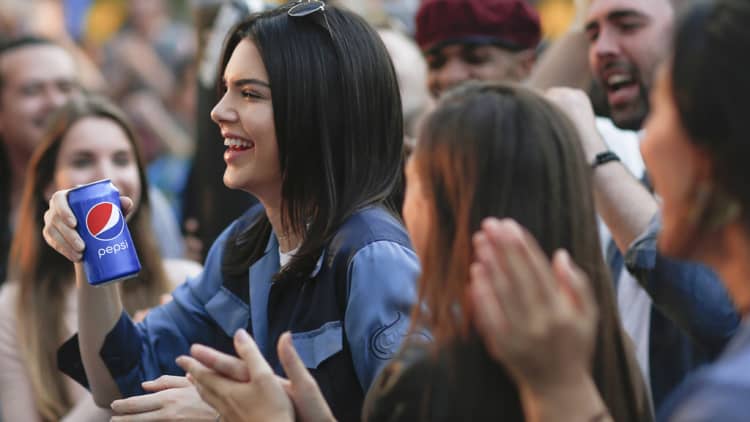
PepsiCo might be pulling its controversial Kendall Jenner ad but it still faces an uphill struggle to recover from its marketing misstep, observers say.
Experts said the beverage giant was trying to be hip and inject its product in a conversation about marches and the racial protest movement, but the ad comes off as insensitive and lacking in authenticity. Even so, they expect Pepsi will recover from the backlash although they add that the company still faces longer-term issues involving its overall marketing strategy.
"Pepsi has tried a lot of things but somehow they've totally lost their way," said Mike Jackson, a Principal of 2050 Marketing, a Los Angeles–based firm that advises Fortune 500 brands and start-ups. "They just don't seem focused."
The response to the Pepsi ad was swift in social media with people tweeting snide remarks about a Pepsi drink somehow making a difference in marches or protests.
Even Bernice King, the youngest daughter of slain civil rights icon Martin Luther King Jr., entered the controversy with a biting post:
@BerniceKing: If only Daddy would have known about the power of #Pepsi.
Pepsi pulled the ad Wednesday and issued a statement saying the company "was trying to project a global message of unity,
The company added, "Clearly we missed the mark, and we apologize. We did not intend to make light of any serious issue. We are removing the content and halting any further rollout. We also apologize for putting Kendall Jenner in this position."
PepsiCo, the Purchase, New York–based company known for beverages and its Frito-Lay snack business, has generally struggled in recent years as consumers shift away from sweetened drinks and look for healthier snacks and less salty foods. The company also has been hampered by its weaker international exposure than rival Coca-Cola.
"Obviously, Pepsi's trends with their core brands aren't going in the right direction," said Jackson. "Consumers' taste
Jackson, a CNBC contributor who worked at Pepsi in the 1980s, said the company has been through several creative teams over the years and changed ad agencies and now appears to be doing more work through an in-house studio. He added that the in-house studio is believed to have produced the controversial ad.
The ad shows Jenner, the 21-year-old supermodel, participating in a photo shoot and then joining up with protestors and approaching a cop with a can of Pepsi soda.
"To put Kendall Jenner in a protest simulating a Black Lives Movement iconic movement, it's comical almost," said Jackson.
Moreover, experts say showing marchers in the ad holding signs featuring the Pepsi logo displays an appropriation of actual protests tied to police shootings and the movement itself.
"The company saw the ad as a chance to be a little edgy and relevant by associating the brand with current events," said Jonah Berger, an associate professor of marketing at the University of Pennsylvania's Wharton School. "I think they missed it in this case, but that's the challenge of playing with fire."
Berger added, "Pepsi is sort of not the brand leader in the space, so they've got to take a little bit more risk. They are trying to skew themselves to a younger demographic so they are willing to be a little
Jackson said it wasn't always this tough for Pepsi. He said the brand achieved great success in the 1980s by using campaigns based on such artists as Madonna and Michael Jackson. "It was driven
That said, he's optimistic Pepsi can bounce back. "It's still one of the greatest, most successful brands.
"I really doubt that Pepsi had any intent to do anything other than kind of make people feel good about things or to encourage coming together and that sort of stuff," said Michael Belch, a professor of marketing at San Diego State University who has done consulting for major beverage brands. "So I don't blame Pepsi for that and don't think it's going to be a very
On the other hand, Belch said a company like Pepsi "shouldn't be putting out things like that without pre-testing them first." He faults the company "for not making sure that they knew what the impact of the ad would be before they put it out there."
Some of the social media


